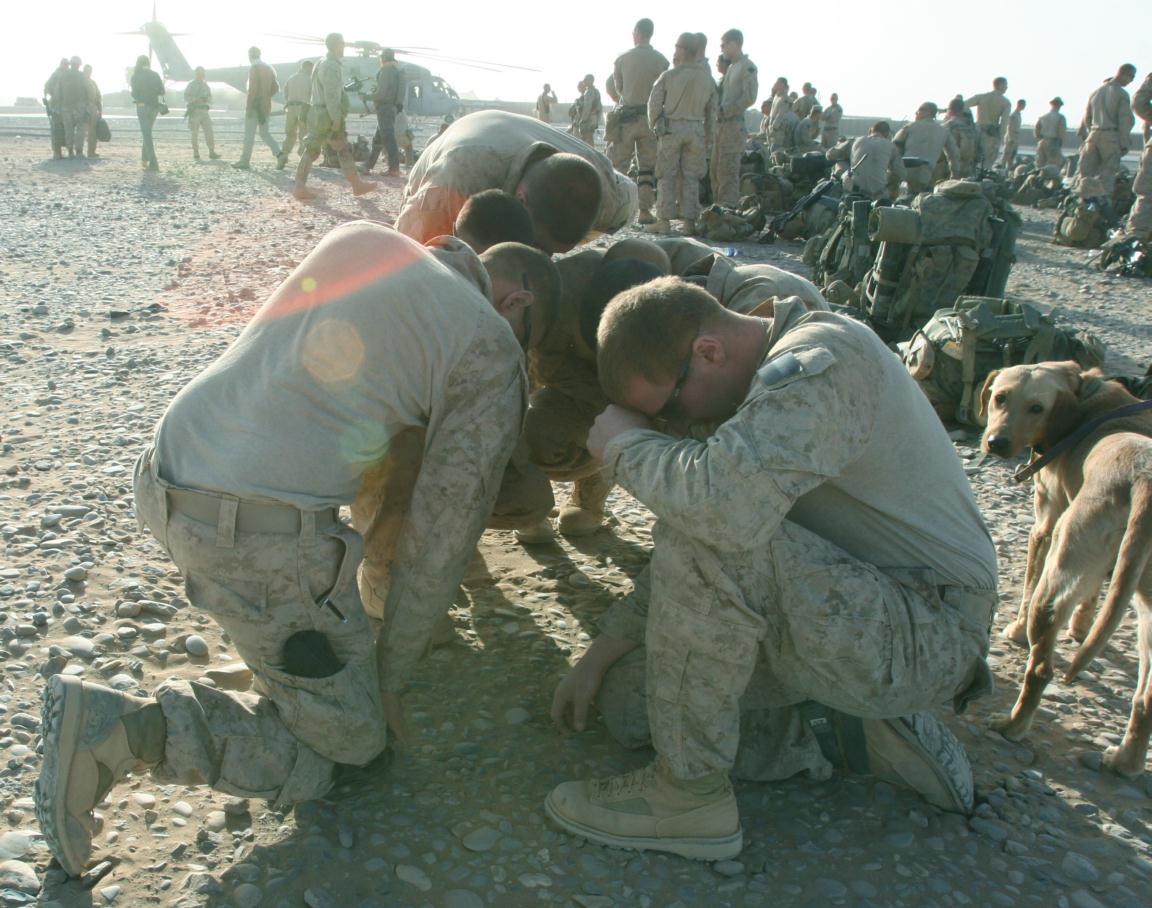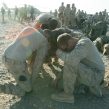
Afghan Officials Say Security Forces Must Secure and Develop Helmand Province if Offensive is to Succeed
Publication: Terrorism Monitor Volume: 7 Issue: 23
By:

Officials in Helmand say that the military’s U.S.-led Operation Khanjar (Dagger) is completely different from previous operations. Mohammad Davoud Ahmadi, spokesperson for the Helmand governor, says that this time they have launched the biggest operation ever against the insurgents in Helmand province. “This time we will move the Taliban from all Helmand districts and after that the plan is to conduct major reconstruction projects in all districts to provide people with jobs. We will ensure permanent security for Helmand residents.” [1]
According to Ahmadi, the operation, which is led by American Marines and supported by the Afghan National Army (ANA), is going smoothly in many districts of Helmand. According to Ahmadi, no civilian casualties have been reported during this operation, except for one small girl who received a small injury in Nawa district but soon recovered.
Mir Wali, a member of parliament from Helmand, says that in some places where large numbers of people were living, residents were displaced because of the military operation. “Most of the people left their houses and are living under the sky. They have no shelters and it is too hot in Helmand now. They were not able to take their possessions with them – they just left everything at their houses.” [2] Mir Wali says that civilian casualties have been reported; “Fourteen people were killed in the Malgir area of Grishk district when the area was bombed by U.S. airplanes. Women, children and old people were among those killed,” said Mir Wali in Kabul.
According to the Helmand MP, if the government and international forces really keep their promises to the people of Helmand, the situation can be changed and local residents will help the government defeat the Taliban in their home regions. If not, the situation will again be like it was in the past. “Time will make clear how the government and international forces can keep their promises. I cannot say anything now about their promises, because they gave many times the same promises but later did nothing for the people.”
Operation Panther’s Claw
In the meantime, another operation, “Panther’s Claw,” is also being conducted in Nad Ali and some other parts of Helmand, led by British forces with support from Danish troops, the ANA and the Afghan National Police. British troops leading the operation have suffered significant casualties, with 11 killed and over 100 wounded since the operation began in early July (Telegraph, July 28).
Ms. Nasima Niazi, a member of parliament representing Helmand, says that local people are suffering many difficulties because of the operation, especially in the areas where the operation is ongoing. [3] “The weather is very hot and people have no homes to live in. People are displaced – they are living in tents but they still hope that security will come to their areas. That is why they have patience,” said the MP in a telephone interview from Helmand.
Nasima said that even in those areas where the Taliban have been removed, the insurgents are still infiltrating to plant roadside bombs. This activity presents people with many problems; “People cannot travel from one place to another. The Taliban are putting roadside bombs everywhere; they don’t care whose car will be exploded. It now takes four hours to travel to a destination normally reached in an hour and a half.”
According to Nasima, in those areas where the operation has ended it seems that security is better and people are returning to their homes. She says that most Helmand residents are against the military operations. “People are afraid that the government and international forces will once again leave and the Taliban will be back. They say that if they are conducting military operations they should do it in a proper way – they should stay in the areas captured by the government and foreign forces from the Taliban and increase the number of police and soldiers based in the area. If [the security forces] leave the areas again, the Taliban will be back in a day.”
Helmand police Chief Asadullah Shirzad says the Taliban have become very weak and are not able to fight Afghan and foreign forces. “The only thing the Taliban are able to do now is to place roadside bombs. During the past few days we have removed more than 100 bombs from different places.” [4] Shirzad says security forces have killed more than 200 Taliban in the latest operation with no casualties to the police, but Ahmadi confirmed four dead ANA soldiers.
Rural Development or Military Infrastructure?
Helmand Governor spokesperson Ahmadi says that American envoys along with Afghanistan Ministry of rural rehabilitation and Development came to Helmand on July 16 and promised the people they will conduct major development projects in the province. “Paving the road from Lashkar Gah (the Helmand provincial capital) to Grishk district and also from Lashkar Gah to Garamsir district is a serious plan which will be conducted soon. Other development projects will come later when the area is completely cleansed of insurgents.”
But Afghan political analyst Fazal Rahman Orya says that paving roads cannot be counted as a development project in the areas where military operations are ongoing. “They are paving roads for their own benefit because the Taliban are planting roadside bombs in unpaved roads and, from the other side, paved roads are good for military convoys. We cannot count that as a development project for the local residents.” [5]
According to Orya, this operation is no different from operations in the past – the authorities always give people promises but they never keep them. The people do not trust the authorities anymore. Orya says that because of the military operations, a huge number of local residents have been displaced and are living in very bad conditions. The Helmand governor’s spokesperson claims only 160 families have been displaced during military operations and they are working together to provide the displaced families with better living conditions.
The Experience of Musa Qala
Orya says the government and international forces gave the same promises regarding stability and security when they recaptured the Musa Qala district of Helmand from the Taliban two years ago. At that time they promised the people they would pave roads, build mosques, schools and clinics and provide people with jobs, but later it became clear these pledges would not be honored. “After a while the Taliban were back and government control was limited to the center of the district. Now the government is unable to support its 200 police there because all the ways to Musa Qala are controlled by the Taliban.”
Orya believes the government and Coalition forces will be able to move the Taliban from the rural districts, but they will not be able to ensure security in all remote areas and villages:
They can move the Taliban from the centers of the districts but they cannot move them from the villages. The government will not be able to control entire districts – they will only remain in the centers of the districts and the remote villages will be again controlled by the Taliban. That is why the government and international forces are losing their trust among the people.
But Ahmadi, the governor’s spokesperson, disagrees with Orya. Ahmadi says this time the government will keep its promises and they will expel the Taliban from all remote villages and ensure security for the whole province:
When Musa Qala was recaptured from the Taliban the roads to Musa Qala were controlled by Taliban. That is why the government was not able to keep their promises, but this time we are keeping open all ways to all districts to support the district authorities and development projects. This time we are not only ensuring security; we promise the people that they will witness a lot of reconstruction and development projects in their districts.
MP Nasima said that some reconstruction projects have already started in Lashkar Gah and other places, which gave future hope to the local residents.
In the meantime, the Taliban has issued its own view of the Helmand offensive, describing it as the last nail in the coffin of President Barack Obama’s strategy for Afghanistan:
The mujahideen and Taliban, who act like hunters in the face-to-face battles, swift campaigns, ambushes, and roadside mines, sent back to the West dozens of enemy aircraft full of the bodies and coffins of their dead sons. Almost 1000 soldiers who have always led a life in comfort and luxury passed out because of the hot climate of the grueling sun in the vast deserts of Helmand, suffering from sun stroke… We would like to declare our stance once again that your advanced and sophisticated weapons will not protect you from death. You will achieve nothing by increasing your forces. They will not make you safe from the wrath of the mujahideen. Do not stick to stubbornness. There is still time to hammer out a logical exit strategy. Listen! The operation of Helmand will prove to be the last nail of the mujahideen in the coffin of Obama’s bloated strategy (Alemarah, July 15).
Helmand MP Mir Wali says that if the government really provides jobs to Helmand residents, the people will not let the Taliban use their villages against the government and foreign troops. “People hope to find jobs. Most of the people are jobless and have nothing to support their families. If the government provides them with jobs they will absolutely avoid Taliban activities in their villages and support the government, but now they don’t trust the government.”
Notes:
1. Mohammad Davoud Ahmad, Spokesperson for the Governor of Helmand Province, was interviewed on July 16, 2009.
2. Helmand Member of Pariliament Mirwali was interviewed on July 26, 2009.
3. Helmand Member of Parliament Nasima Niazi was interviewed on July 26, 2009.
4. Helmand Chief of Police Asadullah Shirzad was interviewed on July 16, 2009.
5. Political analyst Fazal Rahman Orya was interviewed in Kabul on July 16, 2009.





